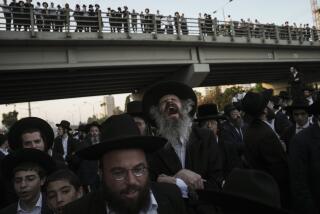Cabinet approves changes to Israel’s draft law
- Share via
JERUSALEM -- Israel’s cabinet on Sunday approved changes to the country’s draft law to increase conscription of ultra-Orthodox Jewish men, putting an end to a decades-long exemption, but not the political debate surrounding the issue.
The twofold move aims to increase ultra-Orthodox participation in the military and other avenues of national service, and advance their integration into the Israeli workforce.
“This is an historic day,” said Finance Minister Yair Lapid, adding that correcting the 65-year old “injustice” will benefit both the ultra-Orthodox, known as Haredim, and Israeli society at large.
Sunday’s cabinet approval clears a significant hurdle, but changes still need to be approved by the Knesset, Israel’s 120-seat parliament, and the matter remains a controversial in Israeli society. However, the measure appears likely to pass.
A committee headed by Science Minister Yakov Peri worked on the amendment to the existing security service law for 10 weeks. Changes include restricting the number of draft exemptions for Torah scholars and allowing deferred service only until the age of 21.
Israel’s military service law states that all Israeli citizens are to be drafted at age 18, including women. In practice, the state exempts many from service, most notably ultra-Orthodox Jews and the country’s Arab minority, who may volunteer for service and do, in small numbers.
Peri expressed hope that upon completion of the legislation, more students in yeshivas -- religious schools -- will enlist in military or national service and this will result in “a more egalitarian, just and genuine society.”
The politically and socially loaded push was a top legislative priority for Prime Minister Benjamin Netanyahu’s new government, the first one in nearly 20 years with no ultra-Orthodox parties. The religious parties refused to join the coalition in protest of what they regard a political assault on their traditional ways of life.
“This is a black day,” said Rabbi Meir Porush, an ultra-Orthodox lawmaker who accused Netanyahu of ingratitude to the community that had given him political backing in past terms.
The reform is expected to be implemented gradually. After a four-year adjustment period, ultra-Orthodox Jews will be drafted at age 18, except for up to 1,800 outstanding Torah scholars a year entitled to receive a deferral of service. About 8,000 ultra-Orthodox men come of draft age each year.
Because of the exemption for some scholars, the reform falls short of some activists’ expectations for an equal, universal draft and a law obliging all Israeli citizens to perform some form of service, military or civilian.
The measure would also extend the service of women from 24 to 28 months. Ultra-Orthodox women will continue to be exempt from service.
And it does not address the prickly issue of service for Israel’s Arab citizens. Netanyahu told the cabinet he views “the participation of Arab Israelis in sharing the burden as very important,” noting that the issue still needed to be worked to completion.
Atty. Gen. Yehuda Weinstein ruled the reform was constitutional, although he said some aspects of it were legally problematic.
Boaz Nol, a leading activist in a movement for “equalizing the burden,” as it is referred to in Israel, told Israeli media that calling the moment historic was premature. “I see balloons and fireworks but no real change yet,” he said, dissatisfied that criminal sanctions are not included in the amendment.
Housing Minister Uri Ariel, however, objects to criminal sanctions against yeshiva students who won’t comply with the law. “These will not increase enlistment among ultra-Orthodox; it will have the opposite effect.”
ALSO:
John Kerry staying in touch with Mideast leaders, U.S. officials say
As Cairo braces for protests, a deadlock over prime minister
With fall of Muslim Brotherhood, is Hamas at risk?
More to Read
Sign up for Essential California
The most important California stories and recommendations in your inbox every morning.
You may occasionally receive promotional content from the Los Angeles Times.










